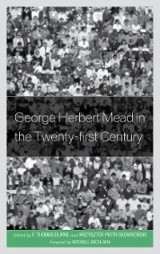Details

George Herbert Mead in the Twenty-First Century
|
48,99 € |
|
| Verlag: | Lexington Books |
| Format: | EPUB |
| Veröffentl.: | 22.03.2013 |
| ISBN/EAN: | 9780739175972 |
| Sprache: | englisch |
| Anzahl Seiten: | 248 |
DRM-geschütztes eBook, Sie benötigen z.B. Adobe Digital Editions und eine Adobe ID zum Lesen.
Beschreibungen
<span><span><span>This volume is composed of extended versions of selected papers presented at an international conference held in June 2011 at Opole University—the seventh in a series of annual American and European Values conferences organized by the Institute of Philosophy, Opole University, Poland. The papers were written independently with no prior guidelines other than the obvious need to address some aspect of George Herbert Mead’s work. While rooted in careful study of Mead’s original writings and transcribed lectures and the historical context in which that work was carried out, these papers have brought that work to bear on contemporary issues in metaphysics, epistemology, cognitive science, and social and political philosophy. There is good reason to classify Mead as one of the original classical American pragmatists (along with Charles Peirce, William James, and John Dewey) and consequently as a major figure in American philosophy. Nevertheless his thought has been marginalized for the most part, at least in academic philosophy. It is our intention to help recuperate Mead’s reputation among a broader audience by providing a small corpus of significant contemporary scholarship on some key aspects of his thought.</span></span></span>
<span><span><span>While rooted in careful study of Mead’s original writings and transcribed lectures and the historical context in which that work was carried out, the papers in this volume have brought Mead’s work to bear on contemporary issues in metaphysics, epistemology, cognitive science, and social and political philosophy.</span></span></span>
<span><span><span>Preface<br>Foreword<br>Introduction: George Herbert Mead and the Chicago School of Pragmatism<br>Part One: General Themes and Assessments<br>George H. Mead as an Empirically Reasonable Philosopher: The “Philosophy of the Act” Reconsidered<br>Mead’s Understanding of Movements of Thought<br>The Concept of the Present and Historical Experience<br>Part Two: Mead and the Twentieth Century<br>The Relationality of Perspectives<br>The Concept of Rule-Following in the Philosophy of George Herbert Mead<br>Mead and the Bergson on Inner States, Self-Knowledge, and Expression<br>The Self as Naturally and Socially Embedded but Also as So Much More<br>Part Three: Mind, Self, and Social Psychology<br>Resolving Two Key Problems in Mead’s Mind, Self, and Society<br>Social-Psychological Externalism and the Coupling/Constitution Fallacy<br>Embodied Mind and the Mimetic Basis for Taking the Role of the Other<br>Games People Play: G. H. Mead’s Conception of Games and Play in a Contemporary Context<br>From Others to the Other: A psychoanalytical Reading of George Herbert Mead<br>Part Four: Social and Political Thought<br>George Herbert Mead on Social and Economic Human Rights<br>The Constitutive Role of Social Values and Political Power in G. H. Mead’s Reflections on Aesthetic Experience<br>George Herbert mead on the Social Bases of Democracy<br>Transforming Global Social Habits: G. H. Mead’s Pragmatist Contributions to Democratic Political Economy<br>Index<br>About the Contributors</span></span></span>
<span><span><span>Krzysztof (Chris) Piotr Skowronski</span><span>, PhD, teaches Contemporary Philosophy, Aesthetics, Cultural Anthropology, Polish Philosophy, and American Philosophy at the Institute of Philosophy, Opole University, Poland. He co-organizes annual conferences on </span><span>American and European Values</span><span>. He authored books: </span><span>Values and Powers. Re-reading the Philosophical Tradition of American Pragmatism</span><span> (Rodopi in 2009) and </span><span>Santayana and America. Values, Liberties, Responsibility</span><span> (Cambridge Scholars 2007). He co-edited books: (with Matthew Flamm) </span><span>Under Any Sky. Contemporary Readings of George Santayana</span><span> (Cambridge Scholars 2007); (with Matthew Flamm and John Lachs) </span><span>American and European Values: Contemporary Philosophical Perspectives</span><span> (Cambridge Scholars 2008); (with Larry Hickman, Matthew Flamm and Jennifer Rea) </span><span>The Continuing Relevance of John Dewey: Reflections of Aesthetics, Morality, Science, and Society</span><span> (Rodopi 2011); (with Kelly Parker) </span><span>Josiah Royce for the Twenty First Century</span><span> (Lexington 2012); and (with Cornelis de Waal) </span><span>The Normative Thought of Charles S. Peirce</span><span> (Fordham, 2012).<br><br></span><span>F. Thomas Burke</span><span>, PhD, is a professor in the Department of Philosophy at the University of South Carolina, USA. Burke is the author of </span><span>Dewey’s New Logic</span><span> (University of Chicago Press, 1994), and </span><span>What Pragmatism Was</span><span> (Indiana University Press, 2013), and is co-editor (with Micah Hester and Robert Talisse) of </span><span>Dewey’s Logical Theory: New Studies and Interpretations</span><span> (Vanderbilt University Press, 2002).</span></span></span>

















